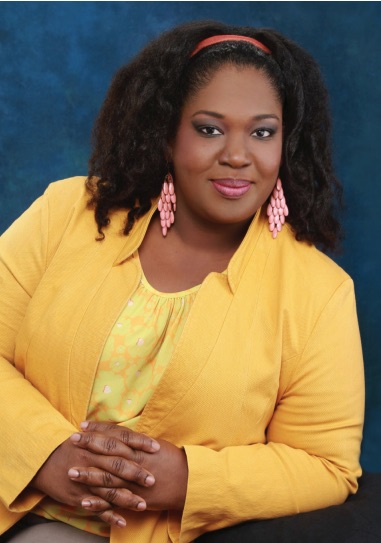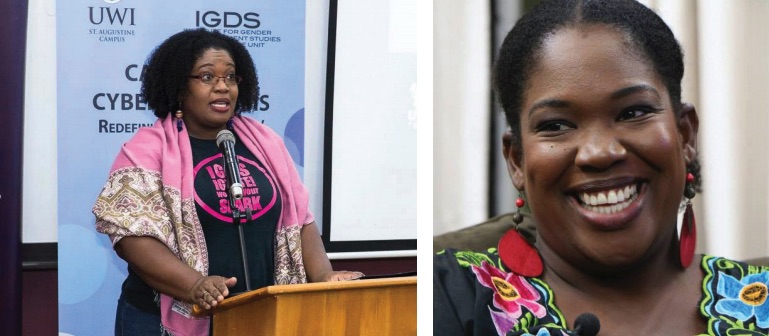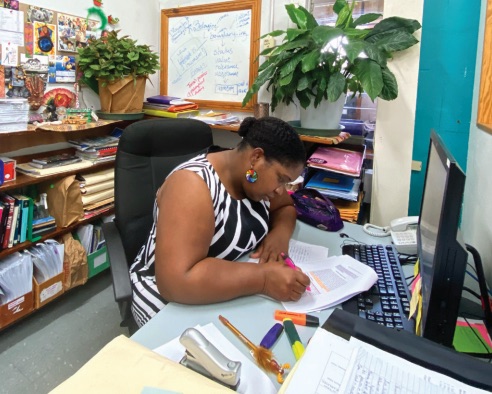Dr Sue Ann Barratt rolls up her sleeves at IGDS

“Things become real to you when you see how it impacts real people in a real way,” says Dr Sue Ann Barratt, new Head of the Institute for Gender and Development Studies (IGDS). She is explaining how she first found her calling while in her third year at The UWI, and how her theoretical interest in gender-based issues shifted when the political became personal.
She started off doing a BA in Media and Communication Studies with Political Science, which she followed with an MA in Communication Studies. That took her to a PhD in Interdisciplinary Gender Studies. Her “aha” moment came as she listened to friends discuss their experiences. It led to a series of theories and hunches that struck her forcefully as she personally witnessed gender-based violence and was startled by how the victim blamed herself. Seeing this conflict was the call that changed her course.
It took her on a journey within academia that led to specialisation in areas of communication conflict and gender-based violence, interpersonal interaction, mass media and computer-mediated communication, social media and user-generated content, gender and ethnic identities, person perception, feminist studies and Carnival studies.
So, when she was appointed on August 1, following the tenure of Dr Gabrielle Hosein, it was no surprise. Although she has been closely associated with IGDS for years, taking the helm during a pandemic has presented unique challenges.
“In terms of the managing and organising, the coordinating side of my function as head, the only difference is that you’re remote instead of being face-to-face, and you lose some of those quick interactions and closeness,” she says, “but the managerial function really retains its normal dynamic, complex and hectic nature.”
Nearly all interactions are filtered through devices and platforms of one sort or the other. It can be mentally exhausting, and you have to help people keep their balance. This is especially vital because they are doing more and the risk of burnout is real.

“IGDS is a safe place where people feel supported and mentored,” she says, but with the personal interaction gone, trying to manage and maintain connections is a real challenge.
She relies on planning to keep things going:
“In IGDS, we have our planned activities and we have things that emerge. There may be public crises that you have to respond to, there may be events or commemorations that people would like you to partner with them. Sometime there is the unexpected.”
She corrects herself, “I should say, always, there is the unexpected.”
Her team has identified what they call a base line—things they are committed to, things they have to deliver—essentially their work plan. So when issues crop up, they assess whether they can manage the “add-ons” and if they can’t, they figure out how to address it.
“It might seem very systematic, some might see rigidity in it,” she concedes, but it creates a space for freedom. “So, I’m going for a very organised approach because I think that helps you to see for a few months, plan for that period, and systematically respond to demand.”
With the pandemic causing upheavals on all fronts, there is a surge in gender-based violence, she says. Her information comes from general global reports, and conversations from those in the field.
“This is violence against women, violence against children and, of course, there is violence against men, but you know that in gender-based violence, the people who are most affected—in terms of it having an impact on their safety and security and health—tend to be women and children.”
It’s not just physical, it is also emotional violence. The situation is compounded by a host of factors: politics, economics, social, and so on. It could be the loss of a job; different perspectives on how you should live; the pressure of managing multiple responsibilities; unresolved conflict; traumas within families, kinship groups or associates; different personalities; the need for contact with others; secrets coming out; or secrets being developed. Some people feel trapped. Some have mental health disorders that are either under-treated or not treated (persons with mental health challenges are often at higher risk for experiencing abuse). All of these things come into play.
All of us have the capacity to help out during these times, she says. Simple things like sharing a meal, checking up with a phone call, listening to the lonely, and small donations, whatever is within your reach.
Dr Barratt is aware that while many are doing these things, “there are a lot of people who are just creating dividing lines.” She finds it disturbing that there’s a kind of global political-economic trend of “pouncing on people’s doubts and confusion and trauma to get some sort of win”.

She is also concerned about the mental health fallout, which needs vital support, although she says that “...our healthcare workers are already so strapped”. So what can we do? “I think it has to start in small groups, close friends, and those close people have to support each other in honest ways.”
In the case of gender-based violence, confronting it has been a problem pre-COVID-19, and there is no simple, one-size-fits-all solution. But it has to start with “people having conversations, being there for each other”.
Unfortunately, she says, there is a large measure of distrust within the society, citing social media exchanges as an example of how that manifests. This becomes a barrier to fostering community and support systems. She acknowledges that there are serious challenges given the times.
“Crises are before us and will continue,” she says. Climate change, environmental degradation, and the human responses to trauma and crisis will continue on. But so must we.